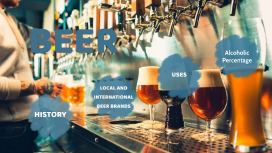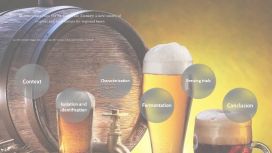Beer Presentation
Transcript: BEER HISTORY HISTORY OF BEER 10,000 BCE 10,000 BCE There are some theories that beer brewing happened at Godin Tepe settlement (now in modern-day Iran) as early as 10,000 BCE when agriculture first developed in the region - People from Euphrates and Tigris call it “the divine drink” from its intoxicating effect 4,000 BCE (Period of Sumerians) 4,000 BCE - First solid proof of beer production - During an archeological excavation in Mesopotamia, a tablet was discovered that showed villagers drinking a beverage from a bowl with straws - Ode to Ninkasi (patron goddess of brewing) – the poem the Archeologists found contained the oldest known recipe for making beer using barley from bread 3,000 BCE (Mesopotamia – Babylon) 3,000 BCE - Babylonians produced over 20 different types of beer - Was considered divine a true gift from the gods; also a sign of wealth - The Code of Hammurabi, the ancient Babylonian set of laws, decreed a daily beer ration to citizens - The drink was so respected that people were sometimes paid for work in beer, instead of money - The beer was porridge-like thick and hard to drink as there was no way to filter beer then, hence Babylonians use straws to drink it 1,500 BCE (Egyptians) 1,500 BCE - Tenenit – Egyptian goddess of beer - from the word “tenemu” which means beer in the Egyptian language - they constantly worked on the taste step-by-step to lessen the bitterness and make it taste better - Heget (or Hecht) – most popular beer in Egypt; honey-flavored beer and ther general word for beer was “zytum” - Beer was often used throughout Egypt as compensation for labor. The workers at the Giza plateau received beer rations three times a day and workers on the Nile were often paid for their work in beer. - Archeologists have even found beer buried in the tombs of the Pharaohs, so they could enjoy the taste of this delicious beverage in the afterlife Europe Europe - Beer arrived in Europe around 5000 BC. Across Northern Europe you find what could be called the “Beer Belt” which stretches from Ireland in the west, through the United Kingdom, Belgium, the Netherlands, Northern France, Germany and Czechoslovakia into Eastern Europe and Russia. - “Zythos” – Greek word of Beer from Egyptian word “zytum”, was not a huge hit right away in Greece - Wine was so popular that it was considered as gift from gods, thus they considered beer a barbaric drink and only fit for lower classes to imbibe - Romans brewed “cerevisia” (beer) quite early, evidence were discovered in the tomb of a beer brewer and a “Cerveserius” (merchant) in ancient Treveris (modern-day Trier) - One of the most common drinks on the outskirts empire of Rome, and the legions of Rome brought beer to Northern Europe Middle Ages Middle Ages - During this period, beer was mostly produced in monasteries all across Europe - With its high nutritional value, beer was a perfect beverage for monks during times of fasting - The production of beer helped the monasteries survive the Dark Ages, as they made enough money to live from selling their beer 1000 AD 1000 AD - People start using hops in the brewing process. This refined its taste by making it much less bitter and gave us the beer as we know it today - Usage of hops in beer production started spreading across Europe 13th Century AD - Beer was finally produced commercially in Germany, England, and Austria - The Germans were brewing “ol” or “ale” (beer) as early as 800 BCE - In a tomb in the village of Kasendorf in northern Bavaria, Kulmback; large quantities of beer jugs, still containing beer, were discovered - The German brewers soon set the standard for most beer makers in Europe. Their beer was of the highest quality, particularly because it was really cold and had a better taste. 13th Century AD Renaissance Period Renaissance Period - beer production also had its “Renaissance,” which means “rebirth” in English - In 1516 came the German Reinheitsgebot (Beer Purity Law) - According to this German law, beer could only contain water, barley, and hops - The Reinheitsgebot was the world’s first consumer protection law, as it regulated the ingredients which could legally be used in brewing beer. It also guaranteed that there was a certain level of purity in German-made beer, which gave it the perception that it was safe to drink. - Like those who preceded them, the Germans also instituted a daily beer ration and considered beer a necessary staple of their diet 1800’s 1800’s - the importance of yeast was discovered by people such as Louis Pasteur and it was added to the “approved” ingredient list - In 1810, Oktoberfest was first held in Munich. Its origins can be traced back to wedding festivities that actually featured mostly wine - Prince Regent Ludwig of Bavaria, the later King Ludwig I, and Princess Therese of Saxony-Hildburghausen were married on October 17, 1810. The entire city was invited to the city gates to celebrate and observe a huge horse race. Over two hundred years later, it’s now the

















